La Butte Rouge
Versione neerlandese del cantante belga Wim De Craene, morto suicida nel 1990 a soli 40 anni.
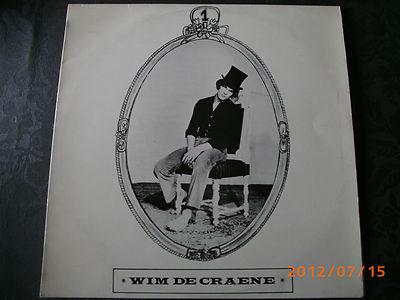
Musica di Jaap van de Merwe, dall’album “Wim De Craene” del 1973.
DE RODE HEUVEL
(continuer)
(continuer)
envoyé par Bernart Bartleby 30/4/2015 - 14:35
There's a Long, Long Trail
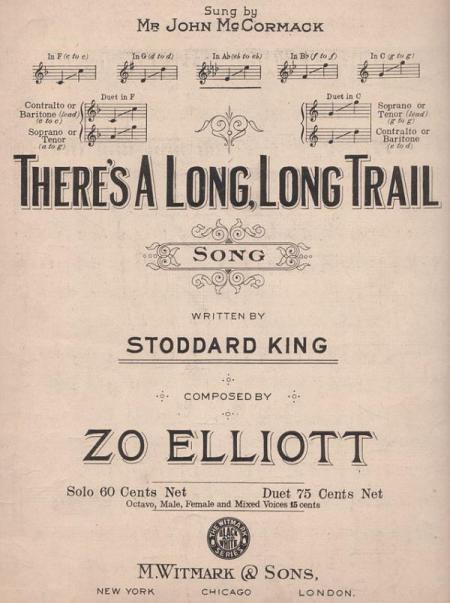
[1913]
Parole di Stoddard King (1889–1933), autore e cantautore
Musica di Alonzo "Zo" Elliott (1891-1964), compositore e cantautore
L’interpretazione più nota è quella del grande tenore irlandese John McCormack, nel 1917.
June Tabor ne ha offerta una propria versione – intitolata “The Long, Long Trail” - nel disco collettivo “We Died in Hell—They Called it Passchendaele” (1993)
La canzone fu pubblicata negli USA nel 1914, poco prima dello scoppio della guerra in Europa e divenne immediatamente popolarissima tra i soldati americani lì spediti a combattere a partire dall’aprile del 1917. Veniva usata spesso per chiudere i concerti per le truppe e l’esecuzione era sempre seguita da un lungo, commosso e significativo silenzio.
Parole di Stoddard King (1889–1933), autore e cantautore
Musica di Alonzo "Zo" Elliott (1891-1964), compositore e cantautore
L’interpretazione più nota è quella del grande tenore irlandese John McCormack, nel 1917.
June Tabor ne ha offerta una propria versione – intitolata “The Long, Long Trail” - nel disco collettivo “We Died in Hell—They Called it Passchendaele” (1993)
La canzone fu pubblicata negli USA nel 1914, poco prima dello scoppio della guerra in Europa e divenne immediatamente popolarissima tra i soldati americani lì spediti a combattere a partire dall’aprile del 1917. Veniva usata spesso per chiudere i concerti per le truppe e l’esecuzione era sempre seguita da un lungo, commosso e significativo silenzio.
Nights are growing very lonely,
(continuer)
(continuer)
envoyé par Bernart Bartleby 30/4/2015 - 14:02
Will Ye Go To Flanders
anonyme
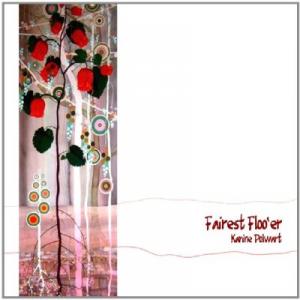
nell'album "Fairest Floo'er" del 2007
WILL YE GO TAE FLANDERS?
(continuer)
(continuer)
30/4/2015 - 12:14
Little Yellow Roses
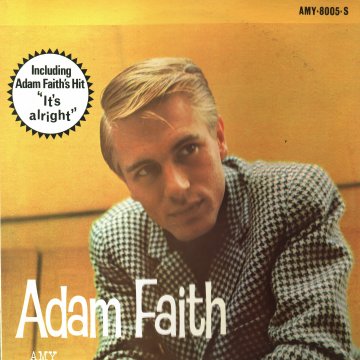
[1961]
Parole e musica di Trevor Peacock (1931-), attore shakespeariano e occasionalmente songwriter.
Arrangiamento di John Barry (1933-2011), grande compositore inglese, soprattutto di colonne sonore per il cinema (sue gran parte di quelle della serie su James Bond 007).
Interpretata dalla popstar Adam Faith (1940-2003) nel suo disco eponimo del 1962.
Testo trovato su Mainly Norfolk: English Folk and Other Good Music.
Una canzone sulla guerra di Spagna o, comunque, su chiunque abbia combattuto per la libertà e l’uguaglianza: “Mio padre mi ha insegnato che tutti gli uomini sono uguali / Qualunque sia il colore, la religione o la provenienza; / Mi ha detto di lottare per le cose in cui ho creduto / Ed è quello che ho fatto, con una pistola in mano.”
Parole e musica di Trevor Peacock (1931-), attore shakespeariano e occasionalmente songwriter.
Arrangiamento di John Barry (1933-2011), grande compositore inglese, soprattutto di colonne sonore per il cinema (sue gran parte di quelle della serie su James Bond 007).
Interpretata dalla popstar Adam Faith (1940-2003) nel suo disco eponimo del 1962.
Testo trovato su Mainly Norfolk: English Folk and Other Good Music.
Una canzone sulla guerra di Spagna o, comunque, su chiunque abbia combattuto per la libertà e l’uguaglianza: “Mio padre mi ha insegnato che tutti gli uomini sono uguali / Qualunque sia il colore, la religione o la provenienza; / Mi ha detto di lottare per le cose in cui ho creduto / Ed è quello che ho fatto, con una pistola in mano.”
Laid on my back with the sun in my eyes;
(continuer)
(continuer)
envoyé par Bernart Bartleby 30/4/2015 - 11:17
Declaring Peace
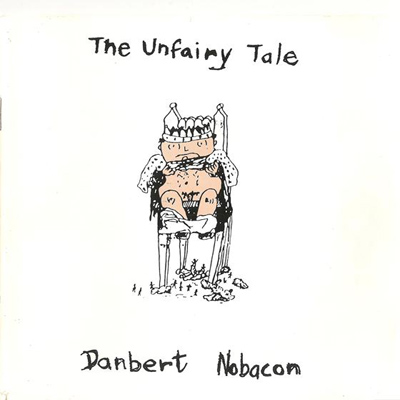
1985
The unfairy tale
The unfairy tale
Whisper the words of wisdom no more
(continuer)
(continuer)
envoyé par dq82 30/4/2015 - 11:03
Parcours:
La guerre des Falklands/Malouines
Flesh and Blood and Feelings
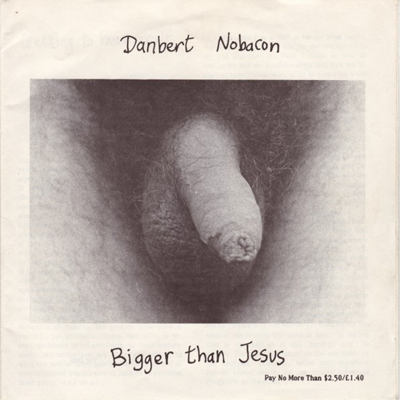
1987
Bigger than Jesus
Came in a 12 page booklet sleeve, housed in a brown paper bag due to the "controversial" nature of the front cover...
Bigger than Jesus
Came in a 12 page booklet sleeve, housed in a brown paper bag due to the "controversial" nature of the front cover...
Margaret thatcher lives in ronald reagan's underpants
(continuer)
(continuer)
envoyé par dq82 30/4/2015 - 11:00
Parcours:
Miss Maggie Thatcher
Times of Crisis

1985
The unfairy tale
The unfairy tale
It gets worse... the earth, if looked after properly, has an estimated lifespan of another four billion years, but in 1983 there were two false alarms of impending nuclear war every three days. They say that such alarms are normal, and present no problem provided they can be identified as false alarms. I said in 1983 there were two false alarms of impending nuclear war, every three days, but in times of crisis with weapons systems already on the alert, there is less than eight minutes to decide whether an attack is underway or not. And there are over forty conventional wars going on in the world today. Times of crisis, you might say. They say that waiting longer than eight minutes would risk a surprise attack, and a loss of command and control. In the trade this is called the "use them or lose... (continuer)
envoyé par dq82 30/4/2015 - 10:54
The Birmingham Six
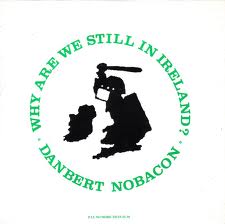
1989
Why Are We Still In Ireland?
Per approfondimenti sui "Sei di Birmingham" si veda l'omonima canzone dei Pogues
Why Are We Still In Ireland?
Per approfondimenti sui "Sei di Birmingham" si veda l'omonima canzone dei Pogues
Birmingham, 1974, there occurred a bloody murder
(continuer)
(continuer)
envoyé par dq82 30/4/2015 - 10:43
Parcours:
Les conflits irlandais
Why Are We Still in Ireland? (Part One)

1989
Why Are We Still In Ireland?
Why Are We Still In Ireland?
Our settlers calling our kingdom great
(continuer)
(continuer)
envoyé par dq82 30/4/2015 - 10:39
Parcours:
Les conflits irlandais
My Love Has Listed (or the White Cockade)
anonyme
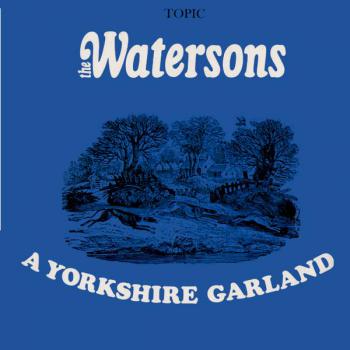
[Fine 700, inizio 800]
Ballata di autore anonimo risalente con tutta probabilità alle guerre napoleoniche, raccolta a Newcastle nel 1821 e pubblicata sulla Blackwood's Magazine di Edimburgo.
Testo trovato su Mainly Norfolk: English Folk and Other Good Music.
La prima incisione dovrebbe essere quella di Bob Davenport nel suo EP “Geordie Songs” del 1959.
La versione qui riportata è quella di Norma Waterson con i suoi familiari (The Watersons) presente nel disco intitolato “A Yorkshire Garland” del 1966.
Una canzone molto interessante, in cui ben due strofe sono dedicate alle colorite maledizioni lanciate da una giovane all’indirizzo dell’esercito e di coloro che hanno indotto il suo fidanzato ad arruolarsi per la guerra…
Ballata di autore anonimo risalente con tutta probabilità alle guerre napoleoniche, raccolta a Newcastle nel 1821 e pubblicata sulla Blackwood's Magazine di Edimburgo.
Testo trovato su Mainly Norfolk: English Folk and Other Good Music.
La prima incisione dovrebbe essere quella di Bob Davenport nel suo EP “Geordie Songs” del 1959.
La versione qui riportata è quella di Norma Waterson con i suoi familiari (The Watersons) presente nel disco intitolato “A Yorkshire Garland” del 1966.
Una canzone molto interessante, in cui ben due strofe sono dedicate alle colorite maledizioni lanciate da una giovane all’indirizzo dell’esercito e di coloro che hanno indotto il suo fidanzato ad arruolarsi per la guerra…
'Tis true, my love's enlisted and he wears a white cockade.
(continuer)
(continuer)
envoyé par Bernart Bartleby 30/4/2015 - 10:36
Will Ye Go To Flanders
anonyme
Versione di June Tabor dal disco collettivo intitolato “We Died in Hell—They Called it Passchendaele” pubblicato nel 1993.
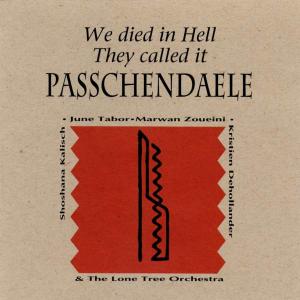
Testo trovato su Mainly Norfolk: English Folk and Other Good Music, dove si fa risalire l’origine della ballata al periodo della guerra di successione spagnola (1702-13)
WILL YE GO TO FLANDERS?
(continuer)
(continuer)
envoyé par Bernart Bartleby 30/4/2015 - 10:03
Home Fit for Heroes
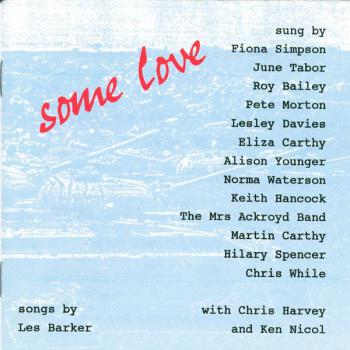
[1992]
Parole di Les Barker (1947-), poeta di Manchester.
Musica di Martin Carthy.
Interpretata da Norma Waterson nel disco di Les Barker intitolato “Some Love”, con June Tabor, Roy Bailey, Eliza e Martin Carthy, Chris Harvey, Ken Nicol e molti altri
Parole di Les Barker (1947-), poeta di Manchester.
Musica di Martin Carthy.
Interpretata da Norma Waterson nel disco di Les Barker intitolato “Some Love”, con June Tabor, Roy Bailey, Eliza e Martin Carthy, Chris Harvey, Ken Nicol e molti altri
They died in their millions,
(continuer)
(continuer)
envoyé par Bernart Bartleby 30/4/2015 - 08:49
Parcours:
Héros, La Grande Guerre (1914-1918)
La Tirolese (E semo livornesi)
anonyme

è una delle due canzoni eponime del Coro Garibaldi d'assalto, ideato e diretto da Pardo Fornaciari, che ne esegue tutte e due le versioni di seguito.
invece che " a prenderci c'è l'osso" si canta " dentro di noi c'è l'osso"
invece che " a prenderci c'è l'osso" si canta " dentro di noi c'è l'osso"
Duccio Arrighi 30/4/2015 - 00:16
The Flowers O' the Forest
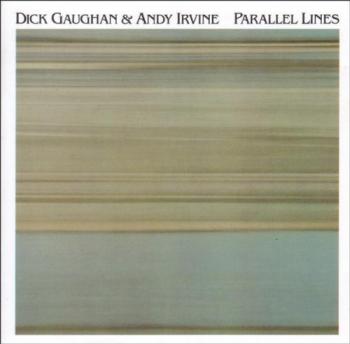
Incisa insieme ad Andy Irvine nel loro disco intitolato “Parallel Lines” pubblicato nel 1982.
The Floo’ers o’ the Forest
The Floo’ers o’ the Forest
THE FLOO’ERS O’ THE FOREST
(continuer)
(continuer)
envoyé par Bernart Bartleby 29/4/2015 - 23:02
The Flowers O' the Forest
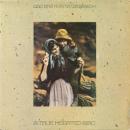
Quello di "The Flowers of the Forest" fu il motivo che un suonatore di cornamusa intonò il 27 aprile 1978 al Putney Vale Cemetery di Londra durante la cerimonia di inumazione della folk rock singer Sandy Denny, morta a soli 31 anni. (en.wikipedia)
Bernart Bartleby 29/4/2015 - 15:31
Atto di forza

2014
Sotto Casa
Testo di Francesco Gazzè
Musica di Max Gazzè
Vincitore del premio Voci per la libertà 2014
"Spesso capita di chiederci - racconta il Premio Amnesty International Italia 2014 Max Gazzè - come un essere umano possa arrivare a compiere gesti atroci, quali siano i guasti che mandano in blocco il cervello e perché nessuno sia ancora riuscito a trovare il sistema per fermare la follia molto prima di quando è già troppo tardi. Facile che resti un pensiero come tanti che balena e sparisce per lasciar posto a qualcosa di più urgente. 'Atto di forza' è uno di quei pensieri, il racconto
per immagini di una di quelle follie. Grazie al premio Amnesty International lo sguardo si sposta e indugia su temi enormi – quale, appunto, la violenza contro le donne - che vengono quasi sempre pigiati in cronaca nera solo perché sembra sia diventato normale che ogni tanto qualcuno perda il controllo.... (continuer)
Sotto Casa
Testo di Francesco Gazzè
Musica di Max Gazzè
Vincitore del premio Voci per la libertà 2014
"Spesso capita di chiederci - racconta il Premio Amnesty International Italia 2014 Max Gazzè - come un essere umano possa arrivare a compiere gesti atroci, quali siano i guasti che mandano in blocco il cervello e perché nessuno sia ancora riuscito a trovare il sistema per fermare la follia molto prima di quando è già troppo tardi. Facile che resti un pensiero come tanti che balena e sparisce per lasciar posto a qualcosa di più urgente. 'Atto di forza' è uno di quei pensieri, il racconto
per immagini di una di quelle follie. Grazie al premio Amnesty International lo sguardo si sposta e indugia su temi enormi – quale, appunto, la violenza contro le donne - che vengono quasi sempre pigiati in cronaca nera solo perché sembra sia diventato normale che ogni tanto qualcuno perda il controllo.... (continuer)
Evade il buio arcigno
(continuer)
(continuer)
envoyé par dq82 29/4/2015 - 15:24
Torturing James Hetfield
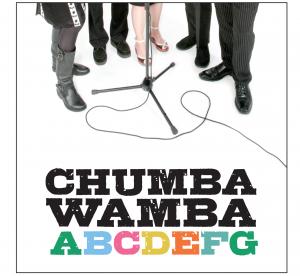
dall'album ABCDFGH del 2010
"Torturing James Hetfield" is a response to James Hetfield's approval of the use of Metallica's music as a torture device against Iraqi prisoners at the Guantanamo Bay detention camp. The song was described as depicting a "wonderful image" by Stefan Appleby in BBC Review. Boff Whalley listed the song as one of his favourites in July 2011.
"Torturing James Hetfield" è una risposta alle dichiarazioni di James Hetfield, chitarrista dei Metallica, che si è detto soddisfatto dell'uso della musica del gruppo contro i prigionieri iracheni nel campo di detenzione di Guantanamo Bay.
The gaffes just keep coming with Metallica: illegal downloads, the documentary, the most recent album being too loud and over-compressed and then James Hetfield comes out and says he’s proud their music has been used to torture Guantanamo prisoners “It represents something that they don’t... (continuer)
"Torturing James Hetfield" is a response to James Hetfield's approval of the use of Metallica's music as a torture device against Iraqi prisoners at the Guantanamo Bay detention camp. The song was described as depicting a "wonderful image" by Stefan Appleby in BBC Review. Boff Whalley listed the song as one of his favourites in July 2011.
"Torturing James Hetfield" è una risposta alle dichiarazioni di James Hetfield, chitarrista dei Metallica, che si è detto soddisfatto dell'uso della musica del gruppo contro i prigionieri iracheni nel campo di detenzione di Guantanamo Bay.
The gaffes just keep coming with Metallica: illegal downloads, the documentary, the most recent album being too loud and over-compressed and then James Hetfield comes out and says he’s proud their music has been used to torture Guantanamo prisoners “It represents something that they don’t... (continuer)
Well, we got James Hetfield
(continuer)
(continuer)
envoyé par dq82 29/4/2015 - 14:25
Parcours:
Guantanamo Bay
Norwich Gaol
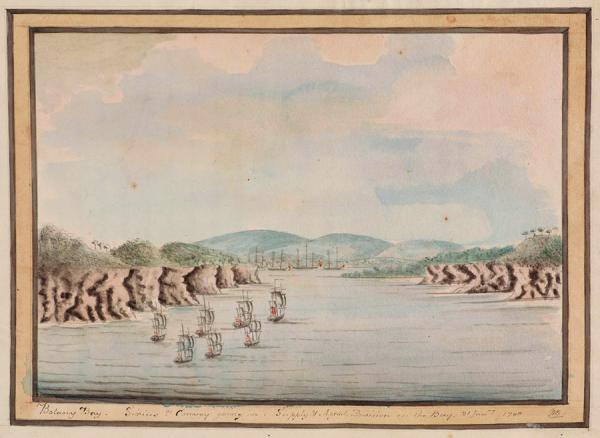
[1977]
Parole e musica di Peter Bellamy
In “The Transports. A Ballad Opera.”
Con la crema dei folksinger inglesi dell’epoca, tra cui The Watersons, Martin Carthy, Nic Jones, A.L. Lloyd, June Tabor, Martin Winsor, Cyril Tawney e Dave Swarbrick.
Testo trovato su Mainly Norfolk: English Folk and Other Good Music
Un’opera che racconta una storia vera, quella di Henry Cabell e Susannah Holmes, “two poor fellows” che nel 1783 furono condannati alla deportazione per aver commesso dei furti a causa della miseria. I due erano amanti e dalla loro relazione era nato un bimbo ma ai due non fu in un primo momento concesso di sposarsi e la famigliola corse il serio rischio di essere smembrata. Uno dei loro carcerieri s’impietosì e intercesse per loro presso il ministro dell’interno.
Così Henry e Susannah poterono unirsi in matrimonio e nel 1787, dando corso alla sentenza, furono imbarcati con il... (continuer)
Parole e musica di Peter Bellamy
In “The Transports. A Ballad Opera.”
Con la crema dei folksinger inglesi dell’epoca, tra cui The Watersons, Martin Carthy, Nic Jones, A.L. Lloyd, June Tabor, Martin Winsor, Cyril Tawney e Dave Swarbrick.
Testo trovato su Mainly Norfolk: English Folk and Other Good Music
Un’opera che racconta una storia vera, quella di Henry Cabell e Susannah Holmes, “two poor fellows” che nel 1783 furono condannati alla deportazione per aver commesso dei furti a causa della miseria. I due erano amanti e dalla loro relazione era nato un bimbo ma ai due non fu in un primo momento concesso di sposarsi e la famigliola corse il serio rischio di essere smembrata. Uno dei loro carcerieri s’impietosì e intercesse per loro presso il ministro dell’interno.
Così Henry e Susannah poterono unirsi in matrimonio e nel 1787, dando corso alla sentenza, furono imbarcati con il... (continuer)
The food is foul, the air is bad, the company not choice;
(continuer)
(continuer)
envoyé par Bernart Bartleby 29/4/2015 - 14:02
Tolpuddle Man
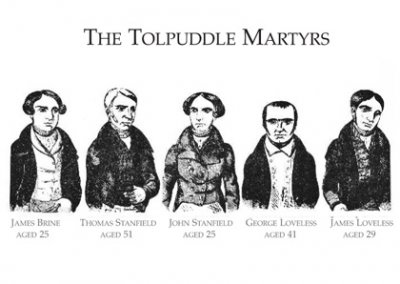
[1995]
Parole e musica di Graham Moore
La canzone che dà il titolo al disco
Nel Regno Unito intorno al 1830, negli anni che seguivano l’abrogazione dell’infame “Combination Act” del 1799, che fino ad allora aveva impedito ai lavoratori di organizzarsi tra di loro per ottenere migliori condizioni, un gruppo di braccianti di Tolpuddle, un villaggio nel Dorset, costituirono tra di loro una società segreta di mutuo soccorso, la Friendly Society of Agricultural Labourers, per lottare insieme contro le diminuzioni salariali che costantemente colpivano la loro categoria. La cosa allarmò i proprietari terrieri locali, i quali chiesero aiuto alle autorità…
Fu così che nel 1833 gli artefici dell’iniziativa furono arrestati, processati e condannati ai bagni penali in Australia, e solo per aver creato una piccola cellula sindacale. Questa la poesia che uno di loro, George Loveless, scrisse subito... (continuer)
Parole e musica di Graham Moore
La canzone che dà il titolo al disco
Nel Regno Unito intorno al 1830, negli anni che seguivano l’abrogazione dell’infame “Combination Act” del 1799, che fino ad allora aveva impedito ai lavoratori di organizzarsi tra di loro per ottenere migliori condizioni, un gruppo di braccianti di Tolpuddle, un villaggio nel Dorset, costituirono tra di loro una società segreta di mutuo soccorso, la Friendly Society of Agricultural Labourers, per lottare insieme contro le diminuzioni salariali che costantemente colpivano la loro categoria. La cosa allarmò i proprietari terrieri locali, i quali chiesero aiuto alle autorità…
Fu così che nel 1833 gli artefici dell’iniziativa furono arrestati, processati e condannati ai bagni penali in Australia, e solo per aver creato una piccola cellula sindacale. Questa la poesia che uno di loro, George Loveless, scrisse subito... (continuer)
Farewell to my family, it's now I must leave you
(continuer)
(continuer)
envoyé par Bernart Bartleby 29/4/2015 - 10:50
The Hunter Dunne
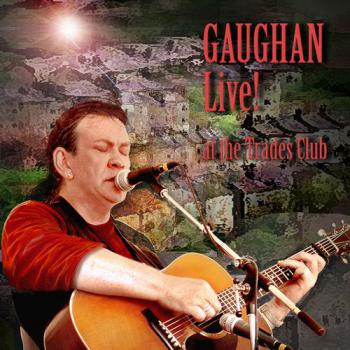
[2006]
Parole e musica di Dick Gaughan
Nell’album intitolato “Lucky For Some”
Poi anche in “Gaughan Live! At The Trades Club” (2008)
“I've had a few people try to read some significance into the choice of name here. There is none, the rhythm of the name simply fitted into the rhythm of the song. I could have used "Joe Bloggs" or "Bob Smith" but I used "John Dunne". They are also meant to be three separate characters with three different stories, illustrative of three different aspects of the same phenomenon - how Capitalism turns everything, including human lives, into commodities.” (Dick Gaughan)
“Qualcuno ha cercato di trovare un qualche significato nella scelta del nome. Non ce n’è nessuno, semplicemente il suono del nome si accordava col ritmo della canzone. Avrei potuto usare "Mario Rossi" o "Bob Smith" ma ho usato "John Dunne". Si tratta inoltre di tre diversi personaggi in tre... (continuer)
Parole e musica di Dick Gaughan
Nell’album intitolato “Lucky For Some”
Poi anche in “Gaughan Live! At The Trades Club” (2008)
“I've had a few people try to read some significance into the choice of name here. There is none, the rhythm of the name simply fitted into the rhythm of the song. I could have used "Joe Bloggs" or "Bob Smith" but I used "John Dunne". They are also meant to be three separate characters with three different stories, illustrative of three different aspects of the same phenomenon - how Capitalism turns everything, including human lives, into commodities.” (Dick Gaughan)
“Qualcuno ha cercato di trovare un qualche significato nella scelta del nome. Non ce n’è nessuno, semplicemente il suono del nome si accordava col ritmo della canzone. Avrei potuto usare "Mario Rossi" o "Bob Smith" ma ho usato "John Dunne". Si tratta inoltre di tre diversi personaggi in tre... (continuer)
John Dunne was a hunter, he hunted wanted men
(continuer)
(continuer)
envoyé par Bernart Bartleby 29/4/2015 - 10:31
Tom Paine's Bones

[1995]
Parole e musica di Graham Moore
La canzone che dà il titolo al suo album del 1995
Interpretata anche da Dick Gaughan nel suo album “Outlaws & Dreamers” del 2001
I The Young'uns l'hanno reinterpretata nel loro album Another Man's Ground (2015).
Thomas Paine (1737-1809) è considerato uno dei Padri Fondatori degli Stati Uniti d’America.
Quacchero, radicale, non conformista, rivoluzionario tanto in America quanto in Francia (dove fu arrestato durante il Terrore e rischiò il collo), autore di opere come “The Age of Reason” (1790, dove difendeva la religiosità, insita nell’uomo, dalla religione consolidata, dal potere ecclesiastico) e “Rights of Man” (1791, in difesa della Rivoluzione francese e dell’egualitarismo), Thomas Paine combattè tutta la vita e morì in povertà e quasi dimenticato. Soltanto sei persone attesero al suo funerale, due di esse erano schiavi neri da lui liberati. I suoi resti vennero in seguito esumati per essere trasportati e sepolti nel natale Norfolk ma andarono dispersi.
Parole e musica di Graham Moore
La canzone che dà il titolo al suo album del 1995
Interpretata anche da Dick Gaughan nel suo album “Outlaws & Dreamers” del 2001
I The Young'uns l'hanno reinterpretata nel loro album Another Man's Ground (2015).
Thomas Paine (1737-1809) è considerato uno dei Padri Fondatori degli Stati Uniti d’America.
Quacchero, radicale, non conformista, rivoluzionario tanto in America quanto in Francia (dove fu arrestato durante il Terrore e rischiò il collo), autore di opere come “The Age of Reason” (1790, dove difendeva la religiosità, insita nell’uomo, dalla religione consolidata, dal potere ecclesiastico) e “Rights of Man” (1791, in difesa della Rivoluzione francese e dell’egualitarismo), Thomas Paine combattè tutta la vita e morì in povertà e quasi dimenticato. Soltanto sei persone attesero al suo funerale, due di esse erano schiavi neri da lui liberati. I suoi resti vennero in seguito esumati per essere trasportati e sepolti nel natale Norfolk ma andarono dispersi.
As I dreamed out one evening
(continuer)
(continuer)
envoyé par Bernart Bartleby 29/4/2015 - 09:42
The Last of England
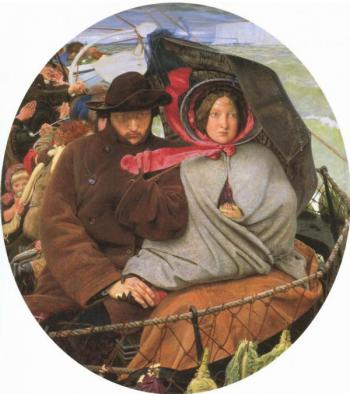
[1995]
Parole e musica di Graham Moore
Nel suo album intitolato “Tom Paine's Bones”
Gran Bretagna, metà 800. L’emigrazione raggiunse il suo picco. Nell’era Vittoriana furono circa 15 milioni quelli che lasciarono il Regno Unito alla volta di Stati Uniti, Canada ed Australia. Molti gli irlandesi in fuga dalla “Great Famine”, molti gli inglesi travolti dai contraccolpi della rivoluzione industriale. Nel 1852, quando il numero di partenze raggiunse il picco di 350.000, il pittore Ford Madox Brown (1821-1893) cominciò a dipingere il suo quadro più famoso, “The Last of England”, ultimato nel 1855.
Parole e musica di Graham Moore
Nel suo album intitolato “Tom Paine's Bones”
Gran Bretagna, metà 800. L’emigrazione raggiunse il suo picco. Nell’era Vittoriana furono circa 15 milioni quelli che lasciarono il Regno Unito alla volta di Stati Uniti, Canada ed Australia. Molti gli irlandesi in fuga dalla “Great Famine”, molti gli inglesi travolti dai contraccolpi della rivoluzione industriale. Nel 1852, quando il numero di partenze raggiunse il picco di 350.000, il pittore Ford Madox Brown (1821-1893) cominciò a dipingere il suo quadro più famoso, “The Last of England”, ultimato nel 1855.
Wasted and worn, tattered and torn
(continuer)
(continuer)
envoyé par Bernart Bartleby 29/4/2015 - 09:02
The Big Battle
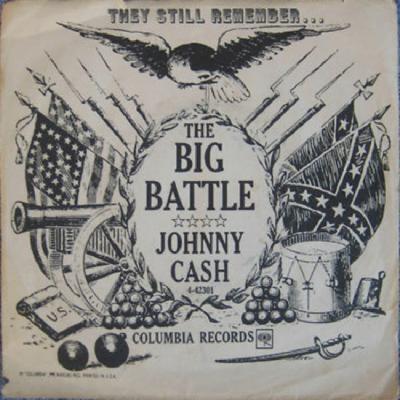
1963
Album: Ring of Fire: The Best of Johnny Cash
L'album, a dispetto del nome, era in gran parte composto di canzoni originali.
Album: Ring of Fire: The Best of Johnny Cash
L'album, a dispetto del nome, era in gran parte composto di canzoni originali.
I think sir the battle is over
(continuer)
(continuer)
29/4/2015 - 02:58
Va, pensiero

Mi permetto di replicare all'amico che biasima questo inno irredentista: questo inno dovrebbe ricordare ad ogni italiano che se oggi si può permettere il lusso di parlare di pace è perchè la guerra la hanno fatta altri 150 e più anni fa al posto suo. Senza di loro forse parleremmo austriaco o qualche altra lingua, e questo sito non esisterebbe affatto. La pace è bella ed è giusto celebrarla, ma bisogna ricordarsi che è pur sempre un regalo che qualcun'altro ci ha fatto pagandola magari con la propria vita. Questo coro è perciò oggi un inno alla pace, così come allora lo è stato di irredentismo e libertà. Caro Rodolfo il pacifismo da salotto è tanto stupido quanto il federalismo da battaglia che alle orate da ali per volare (vedi la foto).
Cristiano 29/4/2015 - 00:08
Records d'un vençut

d'après la version espagnole de Caballero Bonald (RECUERDOS DE UN VENCIDO)
d'une chanson catalane – Records d'un vençut – Joan Isaac – 1977
L'histoire d'un vaincu de la guerre civile. L'exil en France, la tentative de recommencer une nouvelle vie, le rêve – qui pour beaucoup ne fut pas possible ou fut trop tardif – d'un retour dans une patrie libérée de la dictature.
Vois-tu, Lucien l'âne mon ami, c'est une chanson qu'on dira – à juste titre, antifranquiste et conséquemment, antifasciste, antiféloniste et d'une façon doublement particulière :
d'une part, car ce sont les remembrances d'un vaincu, d'un de ceux qui durent connaître le dur exil – pour des raisons que nous connaissons et qui pèsent encore et que l'on appelle communément « real politic » ou en jouant sur les mots : de « reale politica », celle qui sévit toujours aujourd'hui en Espagne (Una, grande...) ;
d'autre part, car... (continuer)
d'une chanson catalane – Records d'un vençut – Joan Isaac – 1977
L'histoire d'un vaincu de la guerre civile. L'exil en France, la tentative de recommencer une nouvelle vie, le rêve – qui pour beaucoup ne fut pas possible ou fut trop tardif – d'un retour dans une patrie libérée de la dictature.
Vois-tu, Lucien l'âne mon ami, c'est une chanson qu'on dira – à juste titre, antifranquiste et conséquemment, antifasciste, antiféloniste et d'une façon doublement particulière :
d'une part, car ce sont les remembrances d'un vaincu, d'un de ceux qui durent connaître le dur exil – pour des raisons que nous connaissons et qui pèsent encore et que l'on appelle communément « real politic » ou en jouant sur les mots : de « reale politica », celle qui sévit toujours aujourd'hui en Espagne (Una, grande...) ;
d'autre part, car... (continuer)
SOUVENIRS D'UN VAINCU
(continuer)
(continuer)
envoyé par Marco Valdo M.I. 28/4/2015 - 23:41
Il Vigneto
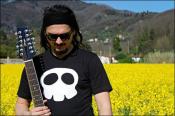
Salve da Joe Natta, vi invio la mia nuova canzone contro la guerra uscita il 25 aprile 2015.
Grazie e a presto!
Grazie e a presto!
Nello scrigno dei pensieri infranti
(continuer)
(continuer)
envoyé par Joe Natta 28/4/2015 - 18:59
Unità di Produzione

E'vero non si vede il video......:-(
tabula rasa elettrificata 28/4/2015 - 16:48
All of No Man's Land Is Ours
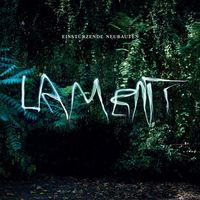
2014
Lament
The album version of LAMENT should be heard as a studio reconstruction of a work primarily designed to be performed live, rather than an official new Einstürzende Neubauten LP proper.
In truth, the piece can only be fully realised, as well as best experienced, in its physical embodiment, performed on or by founding member Andrew Unruh’s gigantic instruments and noise generating devices that visually evoke the horrors the work describes or embeds in the sounds they conjure from the filth and terror of the industrialised 20th century world at war with itself.
But in fulfilling what at first appears to be a surprise commission for such a formidable longtime outsider group, Einstürzende Neubauten transformed the earthy, idiosyncratic contents they mined from academic, state, music hall and internet archives with the help of their two researchers into a richly complex cycle of... (continuer)
Lament
The album version of LAMENT should be heard as a studio reconstruction of a work primarily designed to be performed live, rather than an official new Einstürzende Neubauten LP proper.
In truth, the piece can only be fully realised, as well as best experienced, in its physical embodiment, performed on or by founding member Andrew Unruh’s gigantic instruments and noise generating devices that visually evoke the horrors the work describes or embeds in the sounds they conjure from the filth and terror of the industrialised 20th century world at war with itself.
But in fulfilling what at first appears to be a surprise commission for such a formidable longtime outsider group, Einstürzende Neubauten transformed the earthy, idiosyncratic contents they mined from academic, state, music hall and internet archives with the help of their two researchers into a richly complex cycle of... (continuer)
Hello, Central, Hello, hurry, Give me four-oh-three; Hello, Mary, Hello, Jerry, Yes, yes, this is me! Just landed at the pier And found the telephone, We’ve been parted for a year, Thank God, at last I’m home! Haven’t time to talk a lot, Though I’m feeling mighty gay; Listen, sweet forget-me-not, I’ve only time to say:
(continuer)
(continuer)
envoyé par dq82 28/4/2015 - 16:12
Parcours:
La Grande Guerre (1914-1918)
How did I die?

2014
Lament
The album version of LAMENT should be heard as a studio reconstruction of a work primarily designed to be performed live, rather than an official new Einstürzende Neubauten LP proper.
In truth, the piece can only be fully realised, as well as best experienced, in its physical embodiment, performed on or by founding member Andrew Unruh’s gigantic instruments and noise generating devices that visually evoke the horrors the work describes or embeds in the sounds they conjure from the filth and terror of the industrialised 20th century world at war with itself.
But in fulfilling what at first appears to be a surprise commission for such a formidable longtime outsider group, Einstürzende Neubauten transformed the earthy, idiosyncratic contents they mined from academic, state, music hall and internet archives with the help of their two researchers into a richly complex cycle of... (continuer)
Lament
The album version of LAMENT should be heard as a studio reconstruction of a work primarily designed to be performed live, rather than an official new Einstürzende Neubauten LP proper.
In truth, the piece can only be fully realised, as well as best experienced, in its physical embodiment, performed on or by founding member Andrew Unruh’s gigantic instruments and noise generating devices that visually evoke the horrors the work describes or embeds in the sounds they conjure from the filth and terror of the industrialised 20th century world at war with itself.
But in fulfilling what at first appears to be a surprise commission for such a formidable longtime outsider group, Einstürzende Neubauten transformed the earthy, idiosyncratic contents they mined from academic, state, music hall and internet archives with the help of their two researchers into a richly complex cycle of... (continuer)
I was in a crater
(continuer)
(continuer)
envoyé par dq82 28/4/2015 - 16:00
Parcours:
La Grande Guerre (1914-1918)
Where Have all the Flowers Gone

La versione in tedesco degli Einstürzende Neubauten tratta da Lament del 2014
dq82 28/4/2015 - 15:52
Lament

2014
Lament
The album version of LAMENT should be heard as a studio reconstruction of a work primarily designed to be performed live, rather than an official new Einstürzende Neubauten LP proper.
In truth, the piece can only be fully realised, as well as best experienced, in its physical embodiment, performed on or by founding member Andrew Unruh’s gigantic instruments and noise generating devices that visually evoke the horrors the work describes or embeds in the sounds they conjure from the filth and terror of the industrialised 20th century world at war with itself.
But in fulfilling what at first appears to be a surprise commission for such a formidable longtime outsider group, Einstürzende Neubauten transformed the earthy, idiosyncratic contents they mined from academic, state, music hall and internet archives with the help of their two researchers into a richly complex cycle of... (continuer)
Lament
The album version of LAMENT should be heard as a studio reconstruction of a work primarily designed to be performed live, rather than an official new Einstürzende Neubauten LP proper.
In truth, the piece can only be fully realised, as well as best experienced, in its physical embodiment, performed on or by founding member Andrew Unruh’s gigantic instruments and noise generating devices that visually evoke the horrors the work describes or embeds in the sounds they conjure from the filth and terror of the industrialised 20th century world at war with itself.
But in fulfilling what at first appears to be a surprise commission for such a formidable longtime outsider group, Einstürzende Neubauten transformed the earthy, idiosyncratic contents they mined from academic, state, music hall and internet archives with the help of their two researchers into a richly complex cycle of... (continuer)
DIE LIE DEN
(continuer)
(continuer)
envoyé par dq82 28/4/2015 - 15:44
Parcours:
La Grande Guerre (1914-1918)
Achterland

2014
Lament
The album version of LAMENT should be heard as a studio reconstruction of a work primarily designed to be performed live, rather than an official new Einstürzende Neubauten LP proper.
In truth, the piece can only be fully realised, as well as best experienced, in its physical embodiment, performed on or by founding member Andrew Unruh’s gigantic instruments and noise generating devices that visually evoke the horrors the work describes or embeds in the sounds they conjure from the filth and terror of the industrialised 20th century world at war with itself.
But in fulfilling what at first appears to be a surprise commission for such a formidable longtime outsider group, Einstürzende Neubauten transformed the earthy, idiosyncratic contents they mined from academic, state, music hall and internet archives with the help of their two researchers into a richly complex cycle of... (continuer)
Lament
The album version of LAMENT should be heard as a studio reconstruction of a work primarily designed to be performed live, rather than an official new Einstürzende Neubauten LP proper.
In truth, the piece can only be fully realised, as well as best experienced, in its physical embodiment, performed on or by founding member Andrew Unruh’s gigantic instruments and noise generating devices that visually evoke the horrors the work describes or embeds in the sounds they conjure from the filth and terror of the industrialised 20th century world at war with itself.
But in fulfilling what at first appears to be a surprise commission for such a formidable longtime outsider group, Einstürzende Neubauten transformed the earthy, idiosyncratic contents they mined from academic, state, music hall and internet archives with the help of their two researchers into a richly complex cycle of... (continuer)
Zeg het niet Zeg het niet Zeg het niet Zeg het niet
(continuer)
(continuer)
envoyé par Donquijote82 28/4/2015 - 15:36
Parcours:
La Grande Guerre (1914-1918)
On Patrol in No Man's Land

2014
Lament
The album version of LAMENT should be heard as a studio reconstruction of a work primarily designed to be performed live, rather than an official new Einstürzende Neubauten LP proper.
In truth, the piece can only be fully realised, as well as best experienced, in its physical embodiment, performed on or by founding member Andrew Unruh’s gigantic instruments and noise generating devices that visually evoke the horrors the work describes or embeds in the sounds they conjure from the filth and terror of the industrialised 20th century world at war with itself.
But in fulfilling what at first appears to be a surprise commission for such a formidable longtime outsider group, Einstürzende Neubauten transformed the earthy, idiosyncratic contents they mined from academic, state, music hall and internet archives with the help of their two researchers into a richly complex cycle of... (continuer)
Lament
The album version of LAMENT should be heard as a studio reconstruction of a work primarily designed to be performed live, rather than an official new Einstürzende Neubauten LP proper.
In truth, the piece can only be fully realised, as well as best experienced, in its physical embodiment, performed on or by founding member Andrew Unruh’s gigantic instruments and noise generating devices that visually evoke the horrors the work describes or embeds in the sounds they conjure from the filth and terror of the industrialised 20th century world at war with itself.
But in fulfilling what at first appears to be a surprise commission for such a formidable longtime outsider group, Einstürzende Neubauten transformed the earthy, idiosyncratic contents they mined from academic, state, music hall and internet archives with the help of their two researchers into a richly complex cycle of... (continuer)
What the time? Nine?
(continuer)
(continuer)
envoyé par Donquijote82 28/4/2015 - 15:27
Parcours:
La Grande Guerre (1914-1918)
Last Farewell (or the Last Farewell of Frost, Jones & Williams)
anonyme
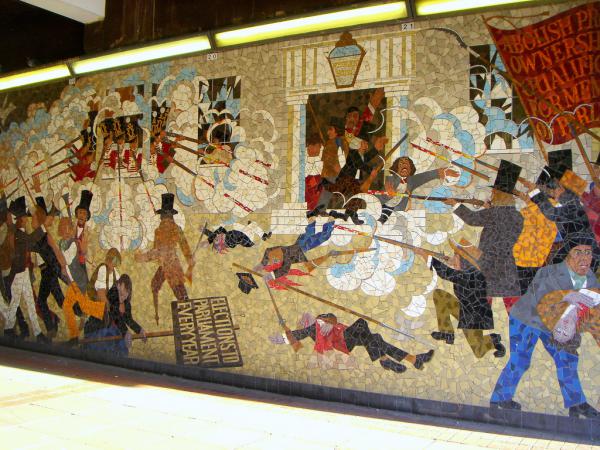
[1839]
Parole di anonimo autore, certamente un militante cartista.
Musica di Dave Moran, del gruppo folk The Halliard
Testo trovato su Mainly Norfolk: English Folk and Other Good Music)
In un disco senza titolo realizzato nel 1968 dal terzetto The Halliard (Dave Moran, Nic Jones e Nigel Paterson) insieme a Jon Raven (fratello di Michael Raven, poeta, musicista ed etnomusicologo, e padre di Paul Raven, bassista dei Ministry e dei Killing Joke).
Newport, Monmouthshire, Wales, novembre 1839.
Il movimento Cartista, che si batteva per una riforma del parlamentarismo in senso egualitario, aveva appena viste respinte le proprie richieste e, anzi, aveva subìto l’arresto di alcuni suoi dirigenti accusati di cospirazione contro la Corona. Gli animi erano molto accesi e si verificarono parecchi disordini in tutto il regno.
A Newport alcune migliaia di cartisti, con alla testa i dirigenti John... (continuer)
Parole di anonimo autore, certamente un militante cartista.
Musica di Dave Moran, del gruppo folk The Halliard
Testo trovato su Mainly Norfolk: English Folk and Other Good Music)
In un disco senza titolo realizzato nel 1968 dal terzetto The Halliard (Dave Moran, Nic Jones e Nigel Paterson) insieme a Jon Raven (fratello di Michael Raven, poeta, musicista ed etnomusicologo, e padre di Paul Raven, bassista dei Ministry e dei Killing Joke).
Newport, Monmouthshire, Wales, novembre 1839.
Il movimento Cartista, che si batteva per una riforma del parlamentarismo in senso egualitario, aveva appena viste respinte le proprie richieste e, anzi, aveva subìto l’arresto di alcuni suoi dirigenti accusati di cospirazione contro la Corona. Gli animi erano molto accesi e si verificarono parecchi disordini in tutto il regno.
A Newport alcune migliaia di cartisti, con alla testa i dirigenti John... (continuer)
As I walked through the town of Portsmouth
(continuer)
(continuer)
envoyé par Bernart Bartleby 28/4/2015 - 14:36
In de loopgraf

2014
Lament
The album version of LAMENT should be heard as a studio reconstruction of a work primarily designed to be performed live, rather than an official new Einstürzende Neubauten LP proper.
In truth, the piece can only be fully realised, as well as best experienced, in its physical embodiment, performed on or by founding member Andrew Unruh’s gigantic instruments and noise generating devices that visually evoke the horrors the work describes or embeds in the sounds they conjure from the filth and terror of the industrialised 20th century world at war with itself.
But in fulfilling what at first appears to be a surprise commission for such a formidable longtime outsider group, Einstürzende Neubauten transformed the earthy, idiosyncratic contents they mined from academic, state, music hall and internet archives with the help of their two researchers into a richly complex cycle of... (continuer)
Lament
The album version of LAMENT should be heard as a studio reconstruction of a work primarily designed to be performed live, rather than an official new Einstürzende Neubauten LP proper.
In truth, the piece can only be fully realised, as well as best experienced, in its physical embodiment, performed on or by founding member Andrew Unruh’s gigantic instruments and noise generating devices that visually evoke the horrors the work describes or embeds in the sounds they conjure from the filth and terror of the industrialised 20th century world at war with itself.
But in fulfilling what at first appears to be a surprise commission for such a formidable longtime outsider group, Einstürzende Neubauten transformed the earthy, idiosyncratic contents they mined from academic, state, music hall and internet archives with the help of their two researchers into a richly complex cycle of... (continuer)
Hoe kan ik dansen in 4/4?
(continuer)
(continuer)
envoyé par dq82 28/4/2015 - 13:16
Parcours:
La Grande Guerre (1914-1918)
The Willy - Nicky Telegrams

2014
Lament
The album version of LAMENT should be heard as a studio reconstruction of a work primarily designed to be performed live, rather than an official new Einstürzende Neubauten LP proper.
In truth, the piece can only be fully realised, as well as best experienced, in its physical embodiment, performed on or by founding member Andrew Unruh’s gigantic instruments and noise generating devices that visually evoke the horrors the work describes or embeds in the sounds they conjure from the filth and terror of the industrialised 20th century world at war with itself.
But in fulfilling what at first appears to be a surprise commission for such a formidable longtime outsider group, Einstürzende Neubauten transformed the earthy, idiosyncratic contents they mined from academic, state, music hall and internet archives with the help of their two researchers into a richly complex cycle of... (continuer)
Lament
The album version of LAMENT should be heard as a studio reconstruction of a work primarily designed to be performed live, rather than an official new Einstürzende Neubauten LP proper.
In truth, the piece can only be fully realised, as well as best experienced, in its physical embodiment, performed on or by founding member Andrew Unruh’s gigantic instruments and noise generating devices that visually evoke the horrors the work describes or embeds in the sounds they conjure from the filth and terror of the industrialised 20th century world at war with itself.
But in fulfilling what at first appears to be a surprise commission for such a formidable longtime outsider group, Einstürzende Neubauten transformed the earthy, idiosyncratic contents they mined from academic, state, music hall and internet archives with the help of their two researchers into a richly complex cycle of... (continuer)
tsar to kaiser]
(continuer)
(continuer)
envoyé par dq82 28/4/2015 - 13:10
Parcours:
La Grande Guerre (1914-1918)
Hymnen

2014
Lament
The album version of LAMENT should be heard as a studio reconstruction of a work primarily designed to be performed live, rather than an official new Einstürzende Neubauten LP proper.
In truth, the piece can only be fully realised, as well as best experienced, in its physical embodiment, performed on or by founding member Andrew Unruh’s gigantic instruments and noise generating devices that visually evoke the horrors the work describes or embeds in the sounds they conjure from the filth and terror of the industrialised 20th century world at war with itself.
But in fulfilling what at first appears to be a surprise commission for such a formidable longtime outsider group, Einstürzende Neubauten transformed the earthy, idiosyncratic contents they mined from academic, state, music hall and internet archives with the help of their two researchers into a richly complex cycle of... (continuer)
Lament
The album version of LAMENT should be heard as a studio reconstruction of a work primarily designed to be performed live, rather than an official new Einstürzende Neubauten LP proper.
In truth, the piece can only be fully realised, as well as best experienced, in its physical embodiment, performed on or by founding member Andrew Unruh’s gigantic instruments and noise generating devices that visually evoke the horrors the work describes or embeds in the sounds they conjure from the filth and terror of the industrialised 20th century world at war with itself.
But in fulfilling what at first appears to be a surprise commission for such a formidable longtime outsider group, Einstürzende Neubauten transformed the earthy, idiosyncratic contents they mined from academic, state, music hall and internet archives with the help of their two researchers into a richly complex cycle of... (continuer)
Heil dir im Siegerkranz,
(continuer)
(continuer)
envoyé par dq82 28/4/2015 - 12:27
Bogey, Bogey, One Pound Ten
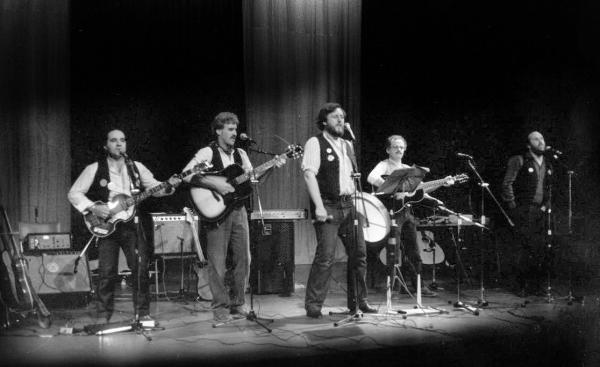
[1982]
Parole di Wynford Jones
Musica de The Chartists
Nell’album eponimo d’esordio
Parole di Wynford Jones
Musica de The Chartists
Nell’album eponimo d’esordio
I am just a common man to the land I give my life
(continuer)
(continuer)
envoyé par Bernart Bartleby 28/4/2015 - 11:39
Chartist Song
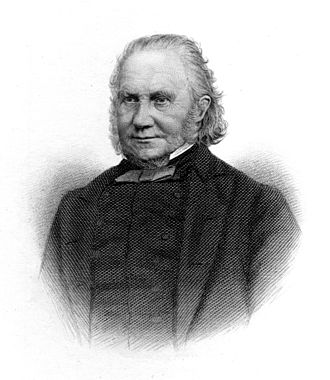
[1842-44]
Versi di Thomas Cooper (1805–1892), calzolaio, poeta ed intellettuale autodidatta, figura preminente del movimento Cartista inglese.
Sull’aria di “Canadian Boat-Song”, nota canzone dei primi dell’800.
Testo trovato sul “mio” sito, Bartleby.com
Thomas Cooper scrisse questa e molte altre canzoni (e pure il suo poema più noto, “Purgatory of Suicides”) nei due anni che trascorse nella prigione di Stafford a causa della sua adesione al movimento Cartista. E di quel movimento proto-socialista fu esponente talmente di spicco che l’ordine del suo arresto arrivò direttamente dalla regina Vittoria, che tra il 1840 ed il 1842 aveva subito ben tre attentati che in molti all’epoca avevano ricondotto ad un complotto dei cartisti.
Uscito di galera Cooper prese le distanze dal radicalismo cartista e purtoppo divenne un molesto predicatore religioso…
Versi di Thomas Cooper (1805–1892), calzolaio, poeta ed intellettuale autodidatta, figura preminente del movimento Cartista inglese.
Sull’aria di “Canadian Boat-Song”, nota canzone dei primi dell’800.
Testo trovato sul “mio” sito, Bartleby.com
Thomas Cooper scrisse questa e molte altre canzoni (e pure il suo poema più noto, “Purgatory of Suicides”) nei due anni che trascorse nella prigione di Stafford a causa della sua adesione al movimento Cartista. E di quel movimento proto-socialista fu esponente talmente di spicco che l’ordine del suo arresto arrivò direttamente dalla regina Vittoria, che tra il 1840 ed il 1842 aveva subito ben tre attentati che in molti all’epoca avevano ricondotto ad un complotto dei cartisti.
Uscito di galera Cooper prese le distanze dal radicalismo cartista e purtoppo divenne un molesto predicatore religioso…
The time shall come when wrong shall end,
(continuer)
(continuer)
envoyé par Bernart Bartleby 28/4/2015 - 11:08
Chartists Anthem
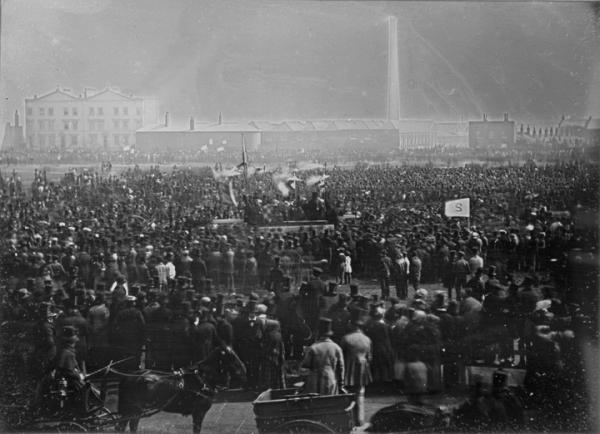
[1840s]
Parole e musica di Ben Boucher (1769-1851), un ex minatore di Dudley, West Midlands (non lontano da Birmingham), che ad un certo punto decise che ne aveva basta di scendere in miniera e divenne un cantore di strada, vivendo della vendita delle sue composizioni.
Il testo che segue è tratto da “The Jolly Machine: Songs of Industrial Protest and Social Discontent from the West Midlands” (1974), uno dei tanti volumi di ricerca curati da Michael Raven (1938-2008), musicista, compositore, poeta ed etnomusicologo originario di Cardiff.
Questo che divenne uno degli inni del movimento “Cartista” inglese è stato interpretato da molti artisti, primi fra tutti Michael Raven e Joan Mills (in “The Jolly Machine” del 1968) e poi Lindsay Cooper (nel suo disco “Rags” del 1980) e i Chumbawamba (in “English Rebel Songs 1381–1914” del 1988, rieditato nel 2003 con l’estensione temporale fino al 1984,... (continuer)
Parole e musica di Ben Boucher (1769-1851), un ex minatore di Dudley, West Midlands (non lontano da Birmingham), che ad un certo punto decise che ne aveva basta di scendere in miniera e divenne un cantore di strada, vivendo della vendita delle sue composizioni.
Il testo che segue è tratto da “The Jolly Machine: Songs of Industrial Protest and Social Discontent from the West Midlands” (1974), uno dei tanti volumi di ricerca curati da Michael Raven (1938-2008), musicista, compositore, poeta ed etnomusicologo originario di Cardiff.
Questo che divenne uno degli inni del movimento “Cartista” inglese è stato interpretato da molti artisti, primi fra tutti Michael Raven e Joan Mills (in “The Jolly Machine” del 1968) e poi Lindsay Cooper (nel suo disco “Rags” del 1980) e i Chumbawamba (in “English Rebel Songs 1381–1914” del 1988, rieditato nel 2003 con l’estensione temporale fino al 1984,... (continuer)
A hundred years, a thousand years,
(continuer)
(continuer)
envoyé par Bernart Bartleby 28/4/2015 - 09:43
Le Bouffon de Franziska
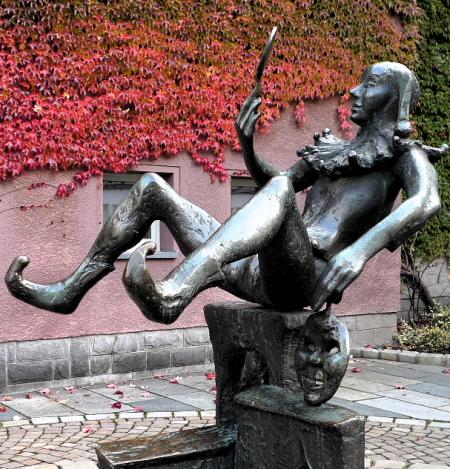
Le Bouffon de Franziska
Chanson française – Le Bouffon de Franziska – Marco Valdo M.I. – 2015
ARLEQUIN AMOUREUX – 5
Opéra-récit historique en multiples épisodes, tiré du roman de Jiří Šotola « Kuře na Rožni » publié en langue allemande, sous le titre « VAGANTEN, PUPPEN UND SOLDATEN » – Verlag C.J. Bucher, Lucerne-Frankfurt – en 1972 et particulièrement de l'édition française de « LES JAMBES C'EST FAIT POUR CAVALER », traduction de Marcel Aymonin, publiée chez Flammarion à Paris en 1979.
Cette fois, Lucien l'âne mon ami, notre Arlequin, amoureux et déserteur, est aux prises avec ses maîtres. Il y a bien sûr l'Arlecchina à laquelle il se doit de rendre des comptes, auprès de qui il veut trouver le sens de sa propre vie ; en qui il met toutes ses espérances.
On ne peut en effet être Arlecchino que si on joue la comédie de l'amour avec son Arlecchina et que toujours, à cette figure, on... (continuer)
Chanson française – Le Bouffon de Franziska – Marco Valdo M.I. – 2015
ARLEQUIN AMOUREUX – 5
Opéra-récit historique en multiples épisodes, tiré du roman de Jiří Šotola « Kuře na Rožni » publié en langue allemande, sous le titre « VAGANTEN, PUPPEN UND SOLDATEN » – Verlag C.J. Bucher, Lucerne-Frankfurt – en 1972 et particulièrement de l'édition française de « LES JAMBES C'EST FAIT POUR CAVALER », traduction de Marcel Aymonin, publiée chez Flammarion à Paris en 1979.
Cette fois, Lucien l'âne mon ami, notre Arlequin, amoureux et déserteur, est aux prises avec ses maîtres. Il y a bien sûr l'Arlecchina à laquelle il se doit de rendre des comptes, auprès de qui il veut trouver le sens de sa propre vie ; en qui il met toutes ses espérances.
On ne peut en effet être Arlecchino que si on joue la comédie de l'amour avec son Arlecchina et que toujours, à cette figure, on... (continuer)
Ach, dit la comtesse Franziska,
(continuer)
(continuer)
envoyé par Marco Valdo M.I. 27/4/2015 - 23:23
Bella Ciao
anonyme

Montesole, 26 aprile 2015
BELLA CIAO
il riallestimento del più importante spettacolo del Folk italiano diventa un disco.
con
Lucilla Galeazzi - voce,
Elena Ledda - voce,
Ginevra Di Marco - voce,
Alessio Lega - voce, chitarra
Andrea Salvadori - chitarra, tzouras, armonium, arrangiamenti
Gigi Biolcati - percussioni, voce
Riccardo Tesi - organetto, arrangiamenti, direzione musicale
BELLA CIAO
il riallestimento del più importante spettacolo del Folk italiano diventa un disco.
con
Lucilla Galeazzi - voce,
Elena Ledda - voce,
Ginevra Di Marco - voce,
Alessio Lega - voce, chitarra
Andrea Salvadori - chitarra, tzouras, armonium, arrangiamenti
Gigi Biolcati - percussioni, voce
Riccardo Tesi - organetto, arrangiamenti, direzione musicale
27/4/2015 - 22:58
Back Alley Surgery
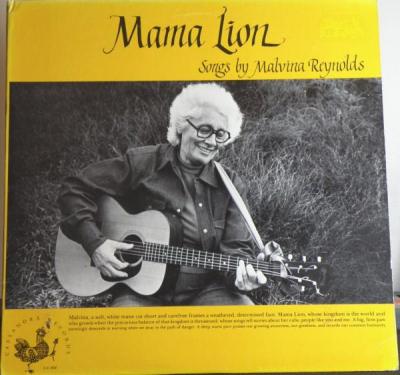
Una canzone che si trova solo in un disco postumo pubblicato nel 1980 ed intitolato "Mama Lion".
(B.B.)
(B.B.)
Supreme Court sits in Washington
(continuer)
(continuer)
27/4/2015 - 19:29
Captain Swing

[1995]
Parole e musica di Graham Moore
Nel suo disco intitolato “Tolpuddle Man”
Interpretata anche da Roy Bailey nel suo “Coda” del 2000.
Negli anni 30 dell’800 nelle campagne inglesi fecero la loro comparsa le prime macchine agricole, così come alcuni decenni prima erano comparsi i telai meccanici nelle fabbriche tessili. L’accoglienza, anche in questo caso, non fu buona, perché accompagnata da licenziamenti di massa e diminuzione delle paghe. Nelle campagne inglesi del Sussex e del Kent gruppi di manifestanti cominciarono ad attaccare le proprietà per distruggere le macchine o appiccare il fuoco ai covoni mietuti con esse. In alcune zone, le azioni vennero annunciate con lettere minatorie a firma “Swing”:
“Sir, Your name is down amongst the Black hearts in the Black Book and this is to advise you and the like of you, who are Parson Justasses, to make your wills. Ye have been the Blackguard... (continuer)
Parole e musica di Graham Moore
Nel suo disco intitolato “Tolpuddle Man”
Interpretata anche da Roy Bailey nel suo “Coda” del 2000.
Negli anni 30 dell’800 nelle campagne inglesi fecero la loro comparsa le prime macchine agricole, così come alcuni decenni prima erano comparsi i telai meccanici nelle fabbriche tessili. L’accoglienza, anche in questo caso, non fu buona, perché accompagnata da licenziamenti di massa e diminuzione delle paghe. Nelle campagne inglesi del Sussex e del Kent gruppi di manifestanti cominciarono ad attaccare le proprietà per distruggere le macchine o appiccare il fuoco ai covoni mietuti con esse. In alcune zone, le azioni vennero annunciate con lettere minatorie a firma “Swing”:
“Sir, Your name is down amongst the Black hearts in the Black Book and this is to advise you and the like of you, who are Parson Justasses, to make your wills. Ye have been the Blackguard... (continuer)
The sun's gone down, the shutters drawn
(continuer)
(continuer)
envoyé par Bernart Bartleby 27/4/2015 - 16:21
Stelutis Alpinis

Ho 65 anni. Ho cominciato ad ascoltare questa "Preghiera di un popolo" (e che da questa terra friulana nasce)quando avevo 6-7 anni. La cantavano gli avventori dell'osteria dei miei,nelle sere d'inverno intorno alla stufa. Contadini , operai,con qualche "Ragazzo del '99" : gente seria e dura; ma, finito il canto, un lungo silenzio continuava a "cantare" ... nel Cuore e negli Occhi.
Ed io, ancora oggi ogni volta che l'ascolto, sento in gola quel famoso "grop".
Provo anch'io una "traduzione" delle ultime due strofe.
Prendi su, prendi una stellina:
è il ricordo del nostro amore.
Tu gli darai un piccolo bacio
e poi nascondila nel seno.
Quando a casa Tu sei sola
e con il Cuore preghi per me,
Il mio spirito Ti vola attorno,
io e la stella
siamo lì con Te.
Trovo Molto Bella anche la "versione" di De Gregori.
Ed io, ancora oggi ogni volta che l'ascolto, sento in gola quel famoso "grop".
Provo anch'io una "traduzione" delle ultime due strofe.
Prendi su, prendi una stellina:
è il ricordo del nostro amore.
Tu gli darai un piccolo bacio
e poi nascondila nel seno.
Quando a casa Tu sei sola
e con il Cuore preghi per me,
Il mio spirito Ti vola attorno,
io e la stella
siamo lì con Te.
Trovo Molto Bella anche la "versione" di De Gregori.
Luigi Girardi 27/4/2015 - 12:20
×
![]()

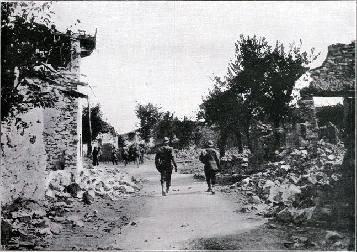
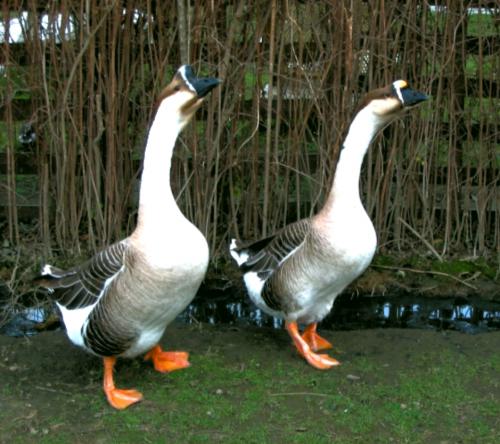
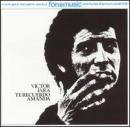
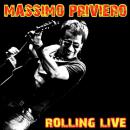

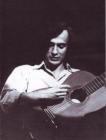
![The Ballad of Nick & Bart [Here's To You]](img/thumb/c3392_130x140.jpeg?1328224498)
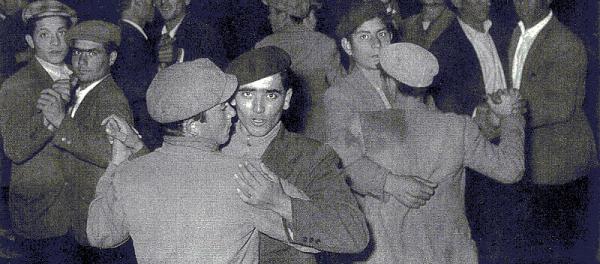
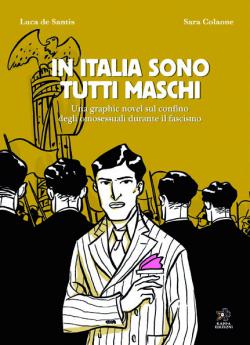
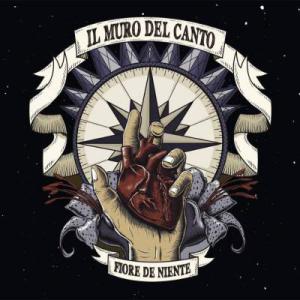

"Oh Doberdò, tomba di ragazzi sloveni!" così recita questa canzone slovena risalente alla Grande Guerra. Doberdob è proprio il paese di Doberdò del lago (oggi in provincia di Gorizia) teatro tra il 1915 e il 1916 di dure e cruente battaglie e citato anche in Fuoco e mitragliatrici.
Questa canzone proviene dalle file dell'esercito austro-ungarico, dove trovarono la morte moltissimi sloveni.
Inseriamo questa canzone grazie alla preziosa segnalazione di Piero Purini - storico e musicista - che ha recentemente presentato lo spettacolo Rifiuto la guerra, che ripercorre l'opposizione alla prima guerra mondiale attraverso una scelta di brani italiani, sloveni, ungheresi, tedeschi, francesi, inglesi ed americani.